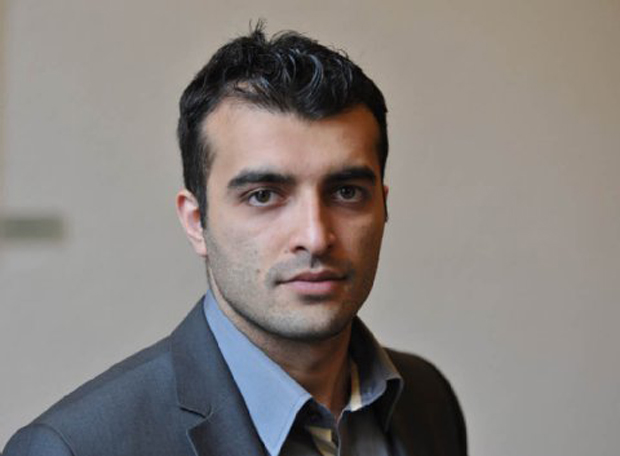9 Oct 2013 | Azerbaijan, Azerbaijan News, News and features, Volume 42.03 Autumn 2013
In the run up to today’s Azerbaijani presidential election, we publish an article and photographs from Index on Censorship magazine showing how the authorities have cracked down on journalists, activists and artists that criticize the government. These stories of the risks journalist and photographers face show how far the regime will go to silence its critics including intimidation and prison sentences. Writers Rasul Jafarov and Rebecca Vincent document the stories of some of the country’s courageous photojournalists, who have documented what life is really like under President Ilham Aliyev.
“In authoritarian regimes, art can serve as a powerful means of expressing criticism and dissent, subverting traditional means of censorship. Photography is particularly telling, capturing the raw truth and making it difficult for even seasoned propagandists to refute. These photographs, from Abbas Atilay, Shahla Sultanova, Mehman Huseynov, Aziz Karimov, Ahmed Muxtar and Jahangir Yusif, show a side of the capital Baku that contrasts sharply with the sleek, glossy image President Ilham Aliyev’s government seeks to portray. They expose an authoritarian regime prepared to arrest those who document protests and criticism — journalists, human rights defenders, civic and political activists and even ordinary citizens.
But those who embrace subjects others prefer to avoid, exposing unsavoury truths the Azerbaijani authorities would prefer to keep hidden — such as corruption and human rights abuses — do so at significant personal risk and hardship.
As journalists, they face intimidation, harassment, threats, blackmail, attacks and imprisonment in connection with their work, which is seen as direct criticism of the authorities. As artists, they face economic hardship and restrictions on where they can display and disseminate their work.
Most of these images were taken during unsanctioned protests in Baku. Photographers face particular hazards when covering protests in Azerbaijan, as not only can they be injured in the general chaos, but they can also be singled out because of their work. The Institute for Reporters’ Freedom and Safety reports that so far in 2013 there have been 17 attacks against journalists and photographers covering protests.
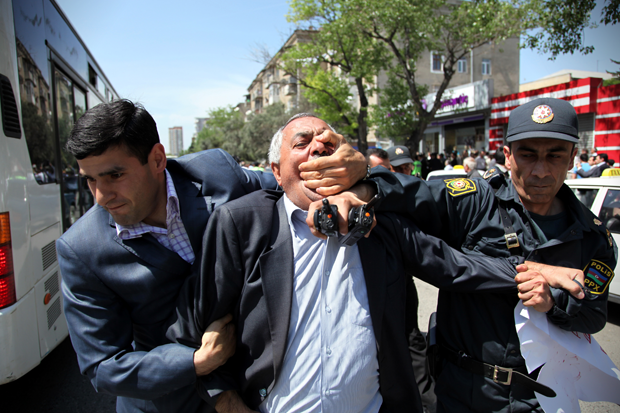
Narimanov Park, Baku, 15 May 2010. Police forcibly detain a political activist during an unsanctioned protest. Photograph by Abbas Atilay
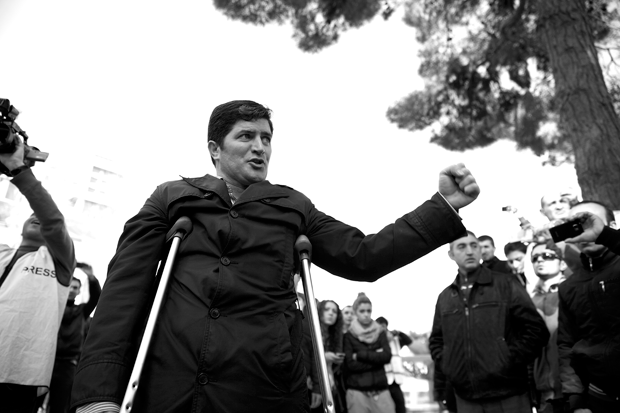
Fountain Square, Baku, 10 March 2013. A political activist during an unsanctioned demonstration protesting the deaths of military conscripts in non-combat situations. Authorities used excessive force to disperse the peaceful protest and detained more than 100 people. Photograph by Jahangir Yusif
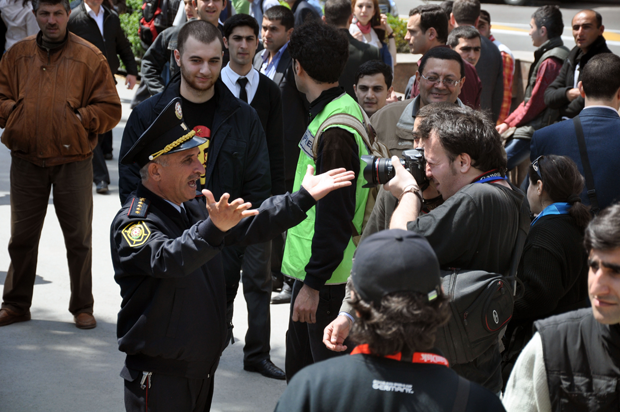
Sabir Park, Baku, 11 March 2011. During an unsanctioned political protest
in the wake of the Arab Spring, a police officer encourages journalists to take his photo. This was a rare move, which the photographer believes was intended to distract photographers from other aspects of the protest, such as police physically restraining protesters. Photograph by Mehman Huseynov
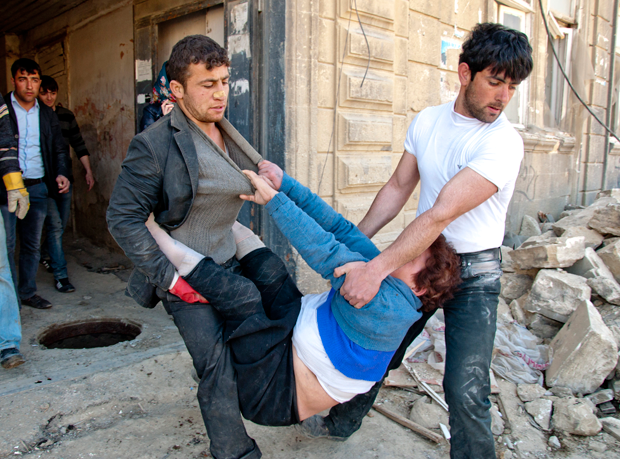
Shamsi Badalbayli Street, Baku, 2 April 2012. A resident is forcibly evicted from the area where the Winter Garden will be constructed. Approximately 300 complaints have been sent to the European Court of Human Rights related to forced evictions from this area. Photograph by Ahmed Muxtar
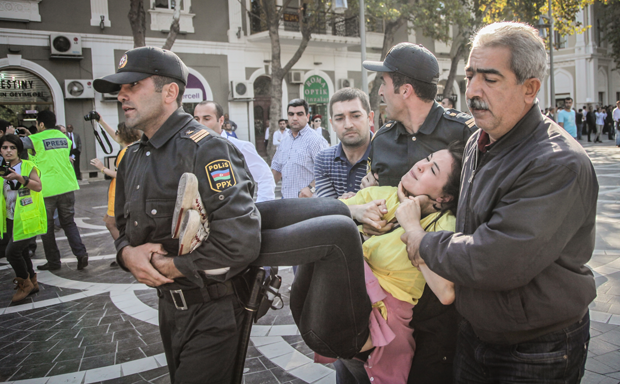
Fountain Square, Baku, 20 October 2012. Police detain a young opposition activist during an unsanctioned protest calling for parliament to be dissolved after a video was released showing an MP discussing the sale of parliamentary seats. Dozens of activists were detained during that protest. Photograph by Aziz Karimov
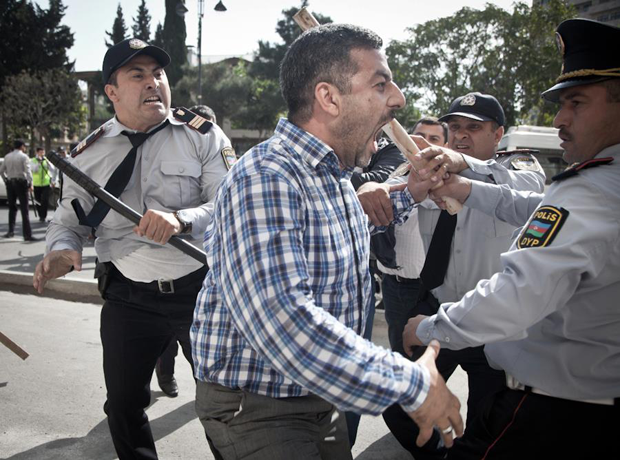
Hijab ban, 5 October 2013. Photograph by Aziz Karimov
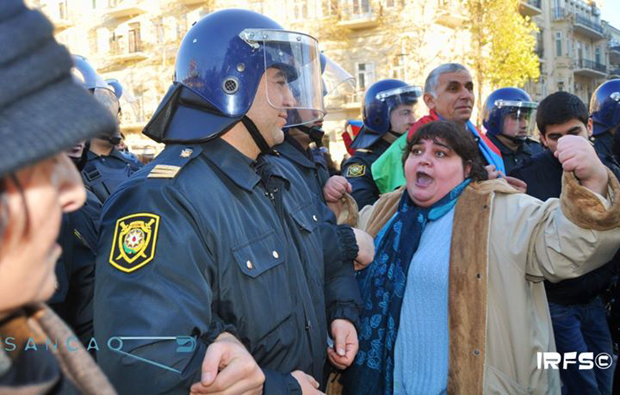
Investigative journalist Khadija Ismayilova confronts police. Photograph by Mehman Huseynov
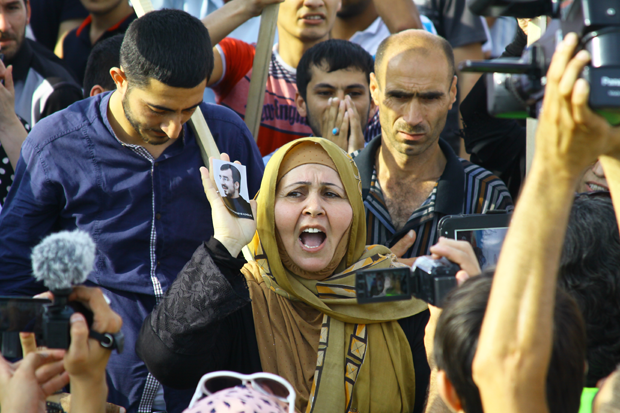
Nevreste Ibrahomova, head of Azerbaijan Islamic Party’s Women Council, holds the photo of an arrested Azerbaijani Islamist and chants freedom to him. Photograph by Shahla Sultanova
Photographers also face arrest and protracted legal action as a result of their work. Mehman Huseynov faces up to five years in prison on politically motivated hooliganism charges stemming from an altercation with a police officer during protests ahead of the Eurovision Song Contest in May 2012. The photographers featured in this story are among the few courageous individuals in Azerbaijan who remain willing to take on the risks associated with this work. They need international support and protection before they, too, become the subjects rather than the artists.”
Rasul Jafarov is the chairman of the Human Rights Club and project coordinator of the Art for Democracy Campaign. Rebecca Vincent is Art for Democracy’s advocacy director. She writes regularly on human rights issues in Azerbaijan
To find out more about the magazine and for subscription options, and read more about stories from the issue click here. These photographers will be part of an exhibition in London this winter. For more details, follow @art4democracy Join us to launch of Index on Censorship’s autumn issue on 15 October. To register for the event, click here.
10 Oct 2017 | Azerbaijan, Azerbaijan Reports, Campaigns -- Featured
[vc_row][vc_column][vc_column_text]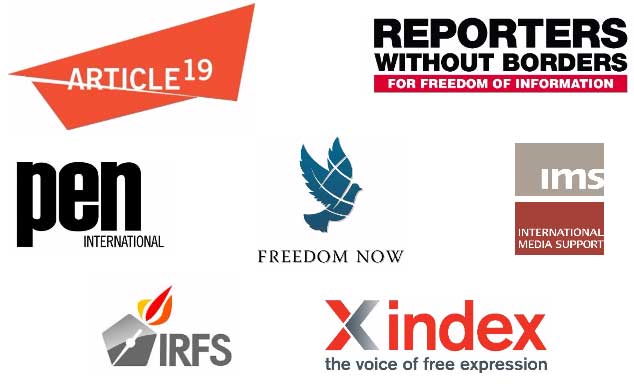
Executive Summary
1. The submitting organisations welcome the opportunity to contribute to the third cycle of the Universal Periodic Review (UPR) of Azerbaijan. This submission focuses on compliance with international human rights obligations with respect to freedom of expression, and peaceful assembly and of association, in particular concerns relating to:
- Constitutional amendments;
- Forced closure and harassment of independent media outlets;
- Arbitrary arrests and arbitrary detentions of critics, and allegations of torture and cruel, inhuman and degrading treatment in detention;
- Legislative restrictions to freedom of expression online;
- Legislative restrictions to freedom of association;
- Legislative restrictions to freedom of peaceful assembly.
2. The Azerbaijani Government has failed to implement many of the recommendations relating to each of these issues accepted during its last UPR, with the situation deteriorating quite significantly in the period under review.
Constitutional amendments
3. Amendments to the Constitution of Azerbaijan were approved through a hasty referendum in September 2016, without any Parliamentary debate or scrutiny of the proposals, and amid a crackdown on journalists, activists and groups opposed to the amendments, preventing voters from having access to all relevant information and opinions. The referendum was also plagued by reports of irregularities, including ballot stuffing and fraud.(1) The Venice Commission also raised concerns that the referendum did not comply with even national legal requirements.(2)
4. The amendments include provisions with deleterious impacts on the rights to freedom of expression, assembly and association in Azerbaijan, including by consolidating the powers of the President and weakening democratic checks and balances, including by weakening the Courts.(3) Article 32 of the Constitution was amended to ostensibly protect against the publication of information about a person’s private life, but its broad scope potentially limits the ability of journalists and others to report information about public officials that are in the public interest. Article 47(III) was amended to prohibit propaganda provoking “hostility based on any other criteria”, which similarly may be applied to limit dissent against the requirements of international human rights law, while Article 49(II) of the Constitution was amended to enable sweeping restrictions on assemblies to prevent the disruption of “public order or public morale”.
5. These Constitutional amendments, and the weakening of the judiciary, further undermine the efforts of civil society, human rights defenders and others to bring national law into compliance with Azerbaijan’s international human rights law obligations, and to secure accountability for human rights violations.
Recommendations
- Initiate reforms to bring the Constitution of Azerbaijan in line with international human rights law, with full and effective public participation, and full Parliamentary scrutiny.
Safety of journalists
6. During its last UPR, the Azerbaijani government accepted 8 recommendations(4) related to ensuring the safety of journalists, including by conducting impartial, thorough and effective investigations into all cases of attacks harassment and intimidation against them, and by bringing perpetrators of such offences to justice.(5) These recommendations have not been implemented, with impunity for attacks against journalists and media workers cultivating a climate of self-censorship.
7. There is still total impunity for the March 2005 murder of Monitor magazine editor-in-chief Elmar Huseynov, as well as for the November 2011 murder of prominent writer and journalist Rafig Tagi.
8. In the period of review, the following cases are highlighted as evidence that impunity, as well as lack of adequate prevention and protection measures, are a continuing problem:
- On 28 April 2017, the blogger Mehman Galandarov was reportedly found dead in his jail cell, and the authorities claim he hanged himself. However, an independent autopsy was never performed, the body was not released and no public investigation was conducted. Civil society representatives refute that Galandarov had reason to commit suicide and that to do so inside his cell would have been extremely difficult.
- On 9 August 2015, well-known journalist and human rights activist Rasim Aliyev, died from injuries sustained from an attack the day before. Previously, on 25 July 2015, Aliyev reported he had received anonymous threats related to photos of police brutality he had posted online. Despite filing a complaint with the police, no action was taken to protect Aliyev or investigate the threats. While several of the people who physically attacked Aliyev were imprisoned in Mary 2016, the link with his journalistic work was never investigated and it appears the masterminds remain at large. In 2012 – 2014, Rasim Aliyev was part of IRFS’ research and investigation team that conducted alternative investigations into murders and attacks of journalists and media workers.
- In June 2015, the Director of Meydan TV and former political prisoner, Emin Milli, reported to the German police that he had received a threat, via an intermediary, from the Azerbaijani Minister of Youth and Sport, Azad Rahimov, in connection with his critical reporting on the 2015 European Games, held in Baku. Milli has publically stated that he believes the threat can be traced directly to President Aliyev, arguing that Rahimov would not have acted without presidential approval. (6)
Recommendations
Enact measures to ensure the safety of journalists, in line with Human Rights Council resolution 33/2,(7) including, inter alia:
- Publicly, unequivocally and systematically condemn violence and attacks against journalists;
- Ensure impartial, speedy, thorough, independent and effective investigations, that also seek to bring masterminds behind attacks to justice, and to ensure victims and their families have access to appropriate remedies, in particular in the cases of Mehman Galandarov, Rasim Aliyev, Elmar Huseynov and Rafig Tagi;
- Create special investigative units and specialised prosecutors, and adopt specific protocols and methods of investigation and prosecution, as well as trainings for key actors in the investigative and prosecutorial processes;
- Systematically collect data to inform policy making on safety of journalists; and,
- Establish protection mechanisms, including early warning and rapid response systems.
Arbitrary arrests and detentions of critics
9. During its last UPR, Azerbaijan accepted 16 recommendations(8) related to ensuring that human rights defenders, lawyers and other civil society actors are able to carry out their legitimate activities without fear or threat of reprisal, obstruction or legal and administrative harassment. Similar recommendations were accepted in relation to the treatment of journalists and writers, including that defamation should be decriminalised.(9)
10. Nevertheless, in the period under review Azerbaijan has continued its practice of targeting critical or dissenting voices with politically motivated arrests on spurious charges, extended pre-trial detentions (ranging from months to more than a year) and custodial sentences. The UN Human Rights Council’s Working Group on Arbitrary Detention, who visited Azerbaijan in May 2016, have noted that, notwithstanding the release of some high profile prisoners, the practice of the government to detain those with oppositional views continues, in violation of their international human rights law obligations.(10)
11. The Azerbaijani authorities arbitrarily arrest individuals for engaging in dissent and release them as a mechanism of control. There are often waves of arbitrary arrests and detentions prior to and around significant events, for example in the run up to and after the European Olympic Games in 2014 and the Formula 1 Grand Prix in 2015. As of August 2017, civil society activists within Azerbaijan estimate there to be 158 confirmed political prisoners. (11, 12)
12. Individuals arbitrarily arrested or detained for their political opposition include:
-
- Ilgar Mammadov, the chairman of political opposition party REAL, was arrested in 2013 on fabricated charges of “inciting violence” and sentenced to seven years’ imprisonment. Despite a May 2014 European Court of Human Rights ruling, which concluded that Mammadov’s arrest took place with the goal “to silence or punish him for criticising the government” and violated his rights under the Convention.(13) In September 2017 the Committee of Ministers of the Council of Europe called again for Mammadov’s release, initiating infringement proceedings against the country.(14) However, he remains behind bars.
- In May 2017, Gozel Bayramli, a high-level official of the opposition Popular Front Party of Azerbaijan (APFP), was detained by Azerbaijani authorities on her return from Georgia where she had been receiving medical treatment.(15) Bayramli was accused of smuggling after border police claimed to have found an undeclared USD 12,000 in her bag and placed in pretrial detention.
- In January 2017, APFP’s deputy chairman Fuad Gahramanli was sentenced to 10 years’ imprisonment, on a number of charges after being arrested in December 2015.
- In March 2016, an APFP advisor Mammad Ibrahim, was sentenced to 3 years’ imprisonment on hooliganism charges, having been arrested in September 2015.
13. Arbitrarily arrested and detained journalists and bloggers, include:
- Mehman Huseynov, well known photo-journalist and blogger. Repeatedly detained, he was imprisoned in March 2017 to 2 years imprisonment under Article 147.2 (slander, which relates to accusation of committing serious or especially serious crime).
- Seymur Hazi, a journalist who wrote for Azadlıq and presented the internet program Azerbaijan Hour was arrested in August 2014, sentenced to 5 years of imprisonment in January 2015 under Article 221.3 (hooliganism, committed using items used as a weapon).
- Aziz Orujov, the director of internet TV Kanal 13, was arrested on 1 June 2017 and his being held in pretrial detention under Articles 192.2.2 (Implementation of business activity without a licence), and 308.2 (abuse of official powers).
- Nijat Aliyev, the editor-in-chief of www.azadxeber.az, a religious-oriented website of a critical nature, was arrested on 21 May 2012. On 9 December 2013, Aliyev was sentenced to 10 years in prison under Articles 167.2.2.1, 234.1, 281.2 and 283.2.3 (ranging from drugs distribution to inciting religious hatred).
- Araz Guliyev, was the editor-in-chief of www.xeber44.com online newspaper, was arrested on 9 September 2012. He was sentenced to 8 years in jail on 5 April 2013 under Articles 228.1, 233, 283.1, 315.2 and 324 (ranging from gun possession, to inciting hatred)
- Fikrat Ibishbayli, also known as Faramazoglu, is editor-in-chief of www.jam.az the portal of the
Journalistic Investigation Center, was arrested on 30 June 2016. On 14 June 2017, he was sentenced to 7 years under Articles 182.2.1, 182.2.2, 182.2.4 (large scale extortion).
- Afgan Sadigov, an editor in chief of the www.azel.tv website, was arrested on 22November 2016. He was sentenced to 2.5 years imprisonment on 12 January 2017, under Article 127.2.3. (Causing serious harm).
- Rashad Ramazanov, an active micro-blogger using social media sites, was arrested on 9 May 2013. On 13 November 2013, he was sentenced to 9 years imprisonment under Article 234.4.3 (Illegal purchase or storage of drugs with intent to sell).
- Elchin Ismayilli,(16) founder and editor of Kend.info, an online news portal, was since arrested on 17 February 2017. On 18 September 2017, the Sheki Court for Grave Crimes sentenced Elchin Ismayilli to 9 years imprisonment. The court found him guilty under articles 182 (extortion of money by threats), 308 (abuse of office) and 311 (bribery).
- Javid Shiraliyev the founder and editor-in-chief of the 7gun.az news portal was sentenced on May 22, 2016 to five years in prison for extortion.(17)
- In an alarming development, Afgan Mukhtarli, a journalist and political activist, was kidnapped in Tbilisi, Georgia on 29 May 2017 and forcibly taken to Azerbaijan, where he reappeared a day after disappearing. He is accused of illegal border crossing and smuggling. His case has caused considerable distress to other Azerbaijani critics living in exile in Georgia.
- Most recently, Mehman Aliyev, who is not related to the ruling family but is a veteran journalist and director of Turan News Agency, was arrested in August 2017 on spurious charges of tax evasion, abuse of power, and illegal entrepreneurship. Though released from custody on 11 September 2017, he was placed under police supervision and the criminal charges against him have not been dropped.
14. The following writers and poets have been arbitrarily arrested and detained:
- Tofiq Hasanli, a poet who expressed his criticism in satirical poets and posted them on his Youtube channel before spreading them through social networking sites, was arrested on 12 October 2015. On 22 August 2016, he was sentenced to 6 years of imprisonment under Article 234.4.3.
- Saday Shakarli, a poet was arrested on 23 December 2015 after the poet published his book Qurd ürəyi (Wolf heart). On 16 May 2016, he was sentenced to 10 years imprisonment under Article 182.2.4 (extortion).
15. The following civil society actors have also been arbitrarily arrested and detained in the period under review:
- On 26 May 2014, Anar Mammadli, Chairman of the Election Monitoring and Democracy Studies Centre (EMDSC), was sentenced to five and a half years on charges of appropriation in significant size, tax evasion, illegal enterprise and abuse of power. He was originally arrested in December 2013 after criticising the October 2013 presidential electoral process. He was released by presidential pardon on 17 March 2016.
- In the summer of 2014, Rasul Jafarov, head of the “Human Rights Club”, Leyla Yunus, Director of the Institute for Peace and Democracy, and her husband and historian Arif Yunus, were arrested, just ahead of the publication of a comprehensive list of political prisoners in Azerbaijan that Jafarov and Leyla Yunus were compiling. Jafarov was sentenced in 2014 to 6.5 years’ imprisonment under Articles 192 (illegal business), 213 (tax evasion) and 308 (abuse of power), but was released by presidential pardon on 17 March 2016. In August 2015, Leyla Yunus was sentenced to 8.5 years’ imprisonment, while Arif Yunus was sentenced to 7 years on charges including fraud and tax evasion. Both were subsequently released from prison in late 2015 on the grounds of ill health.
- Aliabbas Rustamov, head of the Yasavul Law Firm, remains in prison since June 2014. Prior to his arrest, Rustamov had applied to become a legal counsel for Anar Mammadli (above). Sentenced in November 2015 to 7 years on charges relating to bribing an official, his sentence was reduced by one year in January 2017.
16. The following activists have been arbitrarily arrested and detained:
- On 6 May 2014, Ilkin Rustamzade, a member of the Free Youth organization and the National Council, was sentenced to 8 years in prison on charges of organising mass disorder and hooliganism.(18) Rustamzade was detained in May 2013 as part of the same criminal investigation in which seven youth activists of the N!DA Civic Movement were arrested, each later receiving sentences ranging from six to eight years. All were subsequently released, with the exception of Rustamzade, who remains imprisoned.
- In May 2016, two N!DA activists Giyas Ibrahimov and Bayram Mammadov were arrested after they painted graffiti on a statue of former President of Azerbaijan Heydar Aliyev in Baku. Both were sentenced to ten years’ imprisonment in December 2016, on fabricated charges of drug possession. Notably, the judge made the unprecedented decision to issue a harsher sentence than the one requested by prosecutor.
- In January 2017, Elgiz Gahraman, also an N!DA activist, was sentenced to 5.5 years on fabricated drug related charges.(19)
17. Released political prisoners are commonly unable to return to their previous work and political activities. Many have not had convictions quashed, are under surveillance, face travel bans, and ongoing harassment:
- On 22 April 2015, Intigam Aliyev,(20) Chairman of the Legal Education Society and award-winning human rights lawyer, was sentenced to seven and a half years’ imprisonment on charges of tax evasion (Article 213 of the Criminal Code of the Republic of Azerbaijan), illegal enterprise (Article 192) and abuse of power (Article 308.2). In March 2016 he was released when the Azerbaijan Supreme Court reduced his sentence to a five years’ suspended term, but the charges have not been quashed. As a consequence, Aliyev cannot run for public office.
- Prominent investigative journalist, Khadija Ismayilova, was released after 16 months’ detention in May 2016, after the Supreme Court commuted her sentence of 7.5 years’ imprisonment for the absurd charge of “incitement to suicide” to a 3.5 year suspended sentence. Ismayilova is still subject to restrictions on her movement, including a travel ban.
18. The family members in Azerbaijan of dissidents living abroad have also been targeted:
- In December 2016, three relatives of Jamal Ali, a rapper now based in Berlin, were called into the police in Baku shortly after Ali posted a satirical new years’ video, which mocked Azerbaijan’s recent arrests of youth activists from the N!DA movement.
- On 18 February 2017, 12 family members of Ordukhan Teymurkhan, a blogger now based in the Netherlands, were questioned by police to pressure Teymurkhan to stop his activism. Two of his relatives were sentenced to administrative detention.
19. During its last UPR, the Azerbaijan authorities accepted recommendations to enhance the role of the Ombudsman as a preventative mechanism against torture.(21) However, as the Working Group also noted, there are serious and credible allegations of torture and cruel, inhuman and degrading treatment or punishment against those detained for exercising their rights to freedom of expression, which are not adequately investigated. These include the case of Bayram Mammadov (above)(22). Mehman Huseynov, a popular blogger known for exposing corruption among Azerbaijani officials, who was convicted to two years’ imprisonment on defamation charges in March 2017. The charges were in connection to a statement Huseynov made in January 2017, describing torture inflicted upon him by police officers after his detention.
Recommendations
- Fully implement the recommendations of the UN Working Group on Arbitrary Detention following its 2016 country visit, in particular to investigate promptly, thoroughly and impartially all allegations of arbitrary arrest and detention of human rights defenders, journalists, political opponents and religious leaders, and prosecute and punish appropriately those found guilty and provide victims with redress;
- Immediately and unconditionally release all persons arbitrarily detained for exercising their rights to freedom of expression, and, where applicable, quash their convictions and remove restrictions on their freedom of movement;
- Drop the criminal charges against all persons for exercising their right to freedom of expression, including Intigam Aliyev, Khadija Ismayilova and Mehman Aliyev;
- Cease the arbitrary arrest and detentions of individuals for politically motivated reasons;
- Take immediate measures to combat torture and end the practice of impunity, ensuring that those responsible for acts of torture or cruel, inhuman or degrading treatment or punishment are held accountable and that victims obtain redress, including for convictions based on forced confessions.
Forced closure and harassment of independent media outlets and journalists
20. During its last UPR, Azerbaijan accepted 14(23) recommendations related to ensuring respect for media freedom, independent journalism, and media diversity, including to take into account Council of Europe in this regard.(24)
21. The Azerbaijani authorities dominate the country’s media landscape, through regulations, direct ownership or indirect economic control. In the period under review, the majority of independent media outlets have been forced to close or go into exile, with those still operating inside the country subject to police raids, financial pressures, and prosecution of journalists and editors on politically-motivated charges. Where media outlets have been forced to stop print publication and publish only online, their sites are subject to periodic blocking and throttling by the Azerbaijani authorities.
22. Forced closure of media outlets include:
- In June 2014, leading independent newspaper Zerkalo was forced to stop publishing in print, because government control of advertising and distribution networks made it economically untenable.(25) This was a consequence of government pressure on advertisers, and a ban on selling newspapers in the street or metro drastically reducing sales.
- In December 2014, the Baku Bureau of Radio Free Europe/Radio Liberty (RFE/RL) – Radio Azadliq – was forcibly closed after it was raided and placed under seal by police, supposedly in connection with financial mismanagement.(26) Journalists working for RFE/RL in Azerbaijan continue to be harassed by Azerbaijani officials.(27)
- In July 2016, ANS TV was abruptly suspended by Azerbaijan’s regulatory authority the National Television and Radio Council (NTRC), after the station planned an interview with the Turkish opposition figure Fethullah Gülen, under Article 11 of the Law on Television and Radio Broadcasting (to avoid propaganda of terrorism via TV or Radio).(28) The initial suspension was for one month, but in September 2016 the NTRC revoked ANS’ licence(29) and it remains off air.(30)
- In September 2016, the last independent daily newspaper, Azadliq, stopped publishing following the arrest of its financial director Faiq Amirov, cutting off access to the newspaper’s bank accounts and income. The outlet had been financially throttled for years, as the state-owned distribution network consistently failed to transfer sales proceeds that it owed to the newspaper.
- In August 2017, the authorities initiated a criminal case against Turan news agency for tax evasion, the last remaining independent media in the country. Its Editor-in-Chief, Mehman Aliyev, was also arrested on similar trumped-up tax evasion charges and its bank accounts have been frozen, forcing it to officially suspend all activities.(31)
23. Meydan TV, an independent online media outlet whose coverage includes human rights abuses and government corruption, closed its Baku office in December 2014 due to safety concerns. It continues to operate from its headquarters in Germany, in cooperation with journalists in Azerbaijan, despite relentless harassment and state-level blocking of the site since May 2017.(32) In August 2015, the Azerbaijani Prosecutor General’s Office launched a criminal case in relation to Meydan TV’s activities under Articles 213.2.2 (evasion of taxes in a large amount), 192.2.2 (illegal business) and 308.2 (abuse of power) of the Criminal Code. In April 2016, 15 individuals were named in the criminal investigation, with Aynur Elgunash, Aytaj Ahmadova, Sevinj Vagifgizi, and Natig Javadli subject to travel bans.(33) Journalists associated with Meydan TV have been repeatedly summoned for interrogations by the Prosecutor’s Office.(34) The case remains open.
24. Harassment of individual journalists who express critical opinions or deviate from official State accounts in their reporting remains a serious concern. In September 2017, dozens of journalists were dismissed from the government controlled ATV television channel after well-known journalist and TV host. Turan Ibrahimov spoke on a live broadcast about corruption, including how high-ranking officials targeted an entrepreneur to illegally take over his business.(35)
25. Access to foreign media outlets remains restricted, notwithstanding the government’s acceptance of a specific UPR recommendation to expand media freedoms across broadcast platforms, including by ending its ban on foreign broadcasts on FM radio frequencies as well as restrictions on the broadcast of foreign language television programmes.(36) A 2009 ban imposed by NTRC (based on Article 13 of Law of the Republic of Azerbaijan on Telecommunication), remains in place, preventing foreign entities from accessing national frequencies, which effectively took the BBC, Radio Free Europe/Radio Liberty, and Voice of America, off the air.(37) The NTRC, established on 5 October 2002 by Presidential Decree (#795), is fully funded from the state budget and the President directly appoints its members. Similarly, the Azerbaijani public service broadcaster, Ictimai, consistently demonstrates clear bias favourable to the government and ruling party, a problem exacerbated by the lack of media pluralism and alternative information sources in the country.
26. Civil society organisations focused on media freedom issues have also been targeted. In August 2014, the office of the Institute for Reporters’ Freedom and Safety (IRFS) was raided by the authorities in the capital Baku as part of a broader crackdown on NGOs in Azerbaijan. They confiscated equipment, documents, and assets, and the staff were harassed and interrogated by Azerbaijan’s Public Prosecutor office. As a result, IRFS has been forced to cease its operations in Azerbaijan; its Director, Emin Huseynov, remains in exile since fleeing Azerbaijan in 2014.(38)
Recommendations
- Support an independent and pluralistic media sector, ensuring that any official State advertising revenue is allocated according to a clear law, with non-discriminatory and equitable criteria, with allocations subject to full and detailed transparency, with guarantees for the editorial independence of media actors;
- Desist from extra-legal pressure on advertisers that support independent media;
- Desist from interference with the independence of media outlets, including through the harassment of their staff;
- Establish through law a truly autonomous and functionally independent public service broadcasting service to promote diversity in broadcasting in the overall public interest with full editorial independence;
- Replace Presidential Decree #795 which established the NTRC to establish through law a truly independent and adequately funded broadcasting regulatory body, in line with international freedom of expression standards, with clear, transparent and fair policies and procedures, including for the allocation, suspension and revocation of licenses, with the purpose of ensuring media diversity and pluralism in the public interest;
- Cease the regulatory and judicial harassment of independent media outlets, their editorial staff and journalists, including by dropping criminal charges against Meydan TV and the Turan News Agency, and by restoring the license of ANS TV;
- Amend Article 13 of Law of the Republic of Azerbaijan on Telecommunication and lift the ban prohibiting foreign entities from broadcasting on national frequencies, including the BBC, Radio Free Europe/Radio Liberty, and Voice of America to permit broadcasting by foreign outlets.
- Permit media outlets to sell their newspapers in the streets, without undue restriction;
- Ensure redress for the forced closure of IRFS, fully restoring confiscated property and allowing it to resume activities without harassment, including by allowing the return to Azerbaijan of IRFS director Emin Huseynov.
Legislative restrictions to freedom of expression online
27. During its last UPR, Azerbaijan accepted recommendations to protect freedom of expression online.(39) However, various laws have been amended to increase restrictions in the period under review.
28. On 15 November 2016, the Azerbaijani Parliament approved amendments to Articles 148 and 323 of the Criminal Code, creating a new offence of “slander or insult” through “fake user names, profiles or accounts”, as well as increasing penalties for “smearing or humiliating the honour and dignity” of the Azerbaijani president where the offence is committed online.(40) The government has not acted on its 2011 proposal to decriminalize defamation,(41) which currently carries a sentence of up to 3 years in prison. This is in spite of accepting a recommendation at the 2nd UPR cycle to abolish defamation provisions in the criminal code, and to “refrain from initiating defamation lawsuits against civil society activists and journalists”.
29. On 10 March 2017, the Parliament passed new amendments to the laws on “Information, Informatisation and Protection of Information” and “Telecommunications”, extending government control over online media.(42) The amendments establish obligations for website owners or hosts to delete within eight hours, on notice from the authorities, unlawful content.(43) Prohibited content includes any information criminalised under national laws, including broad “extremism” and “defamation” provisions. If the content is not removed, authorities can apply for a court order to block the website, though websites with information considered “a danger for the state or society” can be blocked without a court order, subject to subsequent judicial review.
30. Between March and April 2017, access to a number of online new sites with content critical of the government were blocked in Azerbaijan.(44) Contrary to the provisions in the above laws, neither the hosts or owners of these outlets were informed about the blocks in advance. On 12 May 2017, a Baku Court ruled to impose an official ban on five independent media websites deemed harmful and dangerous for national security. Along with Meydan TV, Azadliq newspaper, Radio Free Europe/ Radio Liberty Azerbaijani Service, Azerbaijan Saati website and video channel, and Turan TV video channel have all been blocked.(45)
31. In September 2017, access to the website of the Organised Crime and Corruption Reporting Project (OCCRP) was blocked inside Azerbaijan after they published the “Azerbaijan Laundromat” – a series of reports that uncovered high level corruption by Azerbaijani officials and implicated European and other diplomats and politicians.(46)
Recommendations
- Reform the laws on “Information, Informatisation and Protection of Information” and “Telecommunications” to remove reference to prohibitions on content that do not comply with international human rights law on freedom of expression, and to ensure that websites are only blocked on the basis of an independent court order and are strictly proportionate to the aim pursued;
- Decriminalise defamation fully, including by reversing the introduction of heightened penalties for online forms of defamation, repealing Articles 148, 148-1, 323.1, and 323.1-1 of the Criminal Code.
Legislative restrictions to freedom of association
32. During its last UPR, the Azerbaijan government accepted numerous specific recommendations to bring its Law on Non-Governmental Organisations into conformity with international human rights law and to create a safe and enabling environment for civil society,(47) but it has not done so.
33. In 2013 and 2014, amendments to the already-onerous 2011 Law on Non-Governmental Organisations (Public Associations and Funds) entered into force. These amendments provided the government with broad discretion to dissolve, impose financial penalties on, and freeze the assets of NGOs for infractions of administrative regulations, closing the few remaining loopholes for the operation of unregistered, independent, and foreign organisations.(48) The Venice Commission has found that the amendments “seem to be intrusive enough to constitute a prima facie violation of the right to freedom of association”(49), and their impact since has caused the UN High Commissioner for Human Rights to call for their repeal.(50)
34. The 2014 amendments established a de facto licensing regime for NGOs, giving the government broad discretion to arbitrarily refuse or delay the registration of grants, establishing complicated and onerous procedures for registration, and allowed for restrictions on NGOs’ access to their bank accounts for non-compliance. The impact of these new rules has been to severely limit civil society space. While some NGOs have reportedly had their bank accounts unfrozen in April 2016,(51) several organisations no longer have in their possession many of the documents required for grant registration, because Azerbaijani investigative authorities seized them in the course of inspections and criminal investigations.(52) Meanwhile, the accounts of many other human rights organisations and independent NGOs remain frozen, including in July 2014 those of the Legal Education Society and its head, Intigam Aliyev, causing the NGO to cease operations.
35. The 2014 amendments have also made it much harder for foreign entities to provide grants to local NGOs, requiring them to have an agreement with government ministries. As a consequence, throughout 2015, foreign governments that previously provided grants to local NGOs postponed their activities.
36. The Government of Azerbaijan established the Azerbaijani State Council for Support to NGOs in 2007, which aims to provide a domestic source of financial assistance to local NGOs. However, NGOs applying to the Council for grants have reported that they were told to sign a statement promising to refuse to have any relations with international NGOs critical of the Government of Azerbaijan, such as Amnesty International, Human Rights Watch, among others. In addition, one NGO receiving funding from the Council has reported that its activities have become subject to constant control by the state donor, undermining its ability to operate independently.
37. On October 21, 2016, President Aliyev signed into law a decree on the Simplification of Registration of Foreign Grants in Azerbaijan, effective from 1 January 2017.(53) The new regulations simplify some procedures for registration of foreign grants, but do not address the legal requirement for NGOs to register grants, and do not eliminate the requirement for the Ministry of Finance to provide an opinion on the expediency of each grant from a foreign donor, and most importantly, they do not change the broad discretion of the authorities to arbitrarily deny grant registration. The Law on Grants and the Law on State Registration and State Register of Legal Entities remains intact.
Recommendations
- Comprehensively reform all laws limiting the right to freedom of association, in particular the 2011 law on NGOs and the 2013 and 2014 amendments thereto, and bring them in line with international human rights law;
Restrictions to freedom of assembly and protests
38. During the last UPR cycle, Azerbaijan accepted multiple recommendations regarding protection of the right to peaceful assembly.(54) However, the authorities continue to severely restrict protests in public spaces and organisers of peaceful actions have been arbitrarily arrested and detained.
39. Amendments to the Law on Peaceful Assembly in May 2008 stipulate that demonstrations may only held in a number of approved sites, all of which are far from the centre of Baku, thereby diminishing the impact of protest. Further changes to the Law on Freedom of Peaceful Assembly, adopted in November 2012 and criticised by UN special procedures, criminalised participants of peaceful gatherings when they “cause significant violation of the rights and legal interests of citizens”.(55) On 14 May 2013, amendments to the Code of Administrative Offences increased the penalties for “organising, holding and attending an unauthorised assembly” to 60 days’ detention, receiving criticism from Council of Europe Commissioner for Human Rights.(56)
40. Police have used unlawful and disproportionate force to disperse protests,(57) and participants in peaceful assemblies have been arbitrarily detained.(58) For example:
- In April 2014, N!DA youth activists Turgut Gambar, Albulfez Gurbanli and Ilkin Rustemzade were sentenced to 10-15 days administrative imprisonment for participating in an unsanctioned memorial service on the four-year anniversary of a shooting at Azerbaijan’s State Oil Academy, and had their hair forcibly shaven off.
- On 6 May 2014, more than 25 protesters were arrested during a rally protesting the sentencing of activists at Baku City Grave Crimes Court. The next day, three protesters were sentenced to administrative detention for participating in an unauthorized protest, with the rest receiving fines. One protester, Kemale Beneyarli, sentenced to 30 days’ administrative detention, alleged that she was severely beaten on the head for refusing to sign an incriminating statement before the trial hearing, and there has been no investigation to these allegations.
Recommendations
- Comprehensively reform the 2008 Law on Peaceful Assembly (as amended) and the 2013 amendments to the Code of Administrative Offences, to bring them into compliance with Article 21 of the International Covenant on Civil and Political Rights, including by removing penalties for “unauthorised assemblies”, and removing blanket prohibitions on assemblies in the centre of Baku, ensuring that any location-based limitations are necessary and proportionate.
Footnotes
1. Institute for Reporters’ Freedom and Safety (IRFS), The Institute for Reporters’ Freedom and Safety Statement on the Outcomes of the Constitutional Referendum in Azerbaijan, (29 September 2016), available at https://www.irfs.org/news-feed/the-institute-for-reporters-freedom-and-safety-statement-on-the-outcomes-of-the-constitutional-referendum-in-azerbaijan/.
2. Council of Europe’s Venice Commission, Azerbaijan Preliminary Opinion on the draft modifications to the constitution submitted to the referendum of 26th September 2016, (20 September 2016), available at
http://www.venice.coe.int/webforms/documents/default.aspx?pdffile=CDL-PI(2016)010-e p. 5
3. See e.g., amendments to Articles 89, 98, 100, 101, 103, 105, 106, and 108 of the Constitution, available at http://www.venice.coe.int/webforms/documents/?pdf=CDL-REF(2016)054-e.
4. Recommendations of Canada, Italy, Germany, Slovenia, United Kingdom, Slovakia, Norway and Austria.
5. Specifically the recommendations of Canada, the United Kingdom, Slovakia, Norway.
6. Council of Europe’s Media Alert Platform, Meydan TV Director Emin Milli Threatened for Critical Reporting on European Games, (30 June 2015), available at – https://go.coe.int/1y4r2
7. ARTICLE 19, “Prevent – Protect – Prosecute: Acting on UN Human Rights Council Resolution 33/2”, (September 2017), available at: https://www.article19.org/data/files/medialibrary/38883/Safety-of-Journalists-guide.pdf
8. Recommendations of Austria, Ireland, Slovakia, United States, United Arab Emirates, Czechia, France, Italy, Canada (x2), Sweden, Chile, Norway, Mexico and Germany.
9. Recommendations of Slovenia, Germany, Canada, and Austria.
10. Report of the Working Group on Arbitrary Detention on its mission to Azerbaijan, A/HRC/36/37/Add.1, 2 August 2017; available at: http://ap.ohchr.org/documents/dpage_e.aspx?si=A/HRC/36/37/Add.1
11. The Working Group on Unified List of Political Prisoners in Azerbaijan, Updated Unified List of Political Prisoners in Azerbaijan, (28 August 2017), available at –
http://smdtaz.org/wp-content/uploads/2017/08/Political-Prisoners-Report_Azerbaijan-August_2017.pdf
12. All Articles in this section refer to Articles of the Criminal Code of Azerbaijan.
13. European Court of Human Rights, Ilgar Mammadov v. Azerbaijan (Application No. 15172/13), 22 May 2014
14. Committee of Ministers of the Council of Europe, Decision CM/Del/Dec(2017)1294/H46-2, 21 September 2017; available at: https://search.coe.int/cm/Pages/result_details.aspx?ObjectID=0900001680749f3c
15. Meydan TV, Customs Service Releases Info. on Arrest of Gozel Bayramli, (29 May 2017), available at – https://www.meydan.tv/en/site/politics/23173/
16. Council of Europe’s Media Alert Platform, Azerbaijani Journalist Elchin Ismayilli Sentenced to 9 year in Prison, (18 September 2017), available at – https://go.coe.int/alXEf
17. International Press Institute, Concerns as head of Azerbaijan news agency arrested, (31 August 2017), available at – https://ipi.media/concerns-as-head-of-azerbaijan-news-agency-arrested/
18. The Azerbaijan Free Expression Platform, Imprisoned (2013): Ilkin Rustemzade, (15 June 2016), available at – http://azerbaijanfreexpression.org/ilkin-rustemzade/
19. The Azerbaijan Free Expression Platform, Arrested (2016): Elgiz Gahraman, (18 August 2016), available at – http://azerbaijanfreexpression.org/arrested-2016-elgiz-gahraman/
20. The Azerbaijan Free Expression Platform, Conditionally Released (2016): Intigam Aliyev, (18 August 2016), available at – http://azerbaijanfreexpression.org/imprisoned-2014-intigam-aliyev/
21. Recommendation of Bulgaria.
22. Meydan TV, Youth activist Bayram Mammadov on torture in police custody, (17 May 2016), available at -https://www.meydan.tv/en/site/politics/14510/
23. Recommendations by Canada (x3), Cyprus (x2), Italy, Germany, Slovenia, United Kingdom, Slovakia, Netherlands (x2), Norway and Austria.
24. Specifically recommendations Italy
25. Reporters Without Borders (RSF), Deprived of income, Azerbaijani paper is forced to stop publishing, (20 June 2014) available at https://rsf.org/en/news/deprived-income-azerbaijani-paper-forced-stop-publishing
26. RFE/RL – Radio Azadliq, Azadliq Radio Baku Bureau Sealed Shut , (26 December 2014), available at -https://www.azadliq.org/a/26763625.html
27. RFE/RL, RFE/RL’s Azerbaijani Service: Radio Azadliq, available at – https://pressroom.rferl.org/p/6126.html
28. https://www.irfs.org/news-feed/private-broadcaster-ans-tvs-broadcast-suspended-for-one-month/
29. Council of Europe (CoE)’s PACE, The functioning of democratic institutions in Azerbaijan (provisional report), p.12
30. Chai-khana, Azerbaijan’s ANS: Death of a TV Station, (17 July 2017), available at: https://chai-khana.org/en/azerbaijans-ans-death-of-a-tv-station
31. CoE, Statement on the arrest of Mehman Aliyev in Azerbaijan, (25 August 2017) available at – https://www.coe.int/en/web/portal/-/statement-on-the-arrest-of-mehman-aliyev-in-azerbaijan
32. http://www.eurasianet.org/node/83591
33. Meydan TV, Fifteen journalists named in criminal investigation of Meydan TV, (21 April 2016), available at -https://www.meydan.tv/en/site/news/13829/
34. E.g. https://www.meydan.tv/en/site/news/24362/
35. IRFS, Major Shake-up at ATV, (27 September 2017), available at – https://www.irfs.org/news-feed/major-shake-up-at-atv/
36. As recommended by Canada.
37. RFE/RL, Azerbaijan Bans RFE/RL, Other Foreign Radio From Airwaves, (30 December 2008), available at https://www.rferl.org/a/Azerbaijan_Bans_RFERL_Other_Foreign_Radio/1364986.html
38. The Guardian, Swiss fly out opposition journalist hiding at its Azerbaijan embassy, (14 June 2015), available at https://www.theguardian.com/world/2015/jun/14/swiss-fly-out-opposition-journalist-hiding-at-its-azerbaijan-embassy
39. Recommendations of Czechia and Canada
40. IRFS, Azerbaijani Parliament Approve Bill Restricting Online Speech, (29 November 2016), available at https://www.irfs.org/news-feed/azerbaijani-parliament-approves-bill-restricting-online-speech/.
41. See National Program for Action to Raise Effectiveness of Protection of Human Rights and Freedoms in the Republic of Azerbaijan, (27 December 2011), available at http://en.president.az/articles/4017.
42. IRFS, Azerbaijani Government Takes Big Steps to Keep Online Media under Control, as Parliament Adopts Restrictive Law related to Information, (10 March 2017) available at https://www.irfs.org/news-feed/azerbaijani-government-takes-big-steps-to-keep-online-media-under-control-as-parliament-adopts-restrictive-law-related-to-information/.
43. As above.
44. Meydan TV, Blocking of Websites in Azerbaijan Moving Ahead at Full Steam, (17 April 2017) available at – https://www.meydan.tv/en/site/news/22317/
45. Eurasianet.org, Azerbaijan: Court Upholds the Blocking of Independent Media Outlets (15 May 2017), available at – http://www.eurasianet.org/node/83591
46. Meydan TV, OCCRP blocked in Azerbaijan, (5 September 2017) available at – https://www.meydan.tv/en/site/news/24988/
47. Recommendations of Austria, Ireland, Slovakia, United States, Switzerland, Czechia, France, Chile, Norway, Mexico, Germany, the Netherlands, Italy, and Uruguay.
48. US State Department, Country Reports for Human Rights Practices 2015: Azerbaijan, http://www.state.gov/documents/organization/253035.pdf p.22
49. Venice Commission Opinion, supra note 3, at para. 91
50. http://www.ohchr.org/EN/NewsEvents/Pages/DisplayNews.aspx?NewsID=16393&LangID=E
51. Minval.az, Власти снимают арест на банковские счета ряда НПО, (06 April 2016), available at – http://minval.az/news/123568530
52. US State Department, Country Reports for Human Rights Practices 2015: Azerbaijan, http://www.state.gov/documents/organization/253035.pdf p.22; See also: http://www.publishwhatyoupay.org/pwyp-news/azerbaijan-authorities-raid-civil-society-offices-in-continued-crackdown-on-ngos/
53. The International Centre for Non-Profit Law, Civic Freedom Monitor: Azerbaijan, (29 May 2017), available at – http://www.icnl.org/research/monitor/azerbaijan.html
54. Recommendations of Slovakia, United States, Germany, France, Uruguay, and Hungary.
55. http://daccess-dds-ny.un.org/doc/UNDOC/GEN/G14/046/29/PDF/G1404629.pdf?OpenElement
56. CoE Europe Commissioner for Human Rights, Report following Commissioner Muižnieks visit to Azerbaijan – 22 to 24 May 2013, (6 August 2013), available at – https://wcd.coe.int/com.instranet.InstraServlet?command=com.instranet.CmdBlobGet&InstranetImage=2501767&SecMode=1&DocId=2130154&Usage=2
57. Such as the official shown in the photo on the cover of ARTICLE 19’s report ‘Living as Dissidents’, taken during a 14 April 2010 unsanctioned demonstration staged by the Musavat Party. See ARTICLE 19, ‘Azerbaijan: Authorities Clamp Down on Protesters in First Election-Related Demonstration’, 15 April 2010. http://www.article19.org/pdfs/press/azerbaijan-authorities-clamp-down-on-protesters-in-first-election-related-de.pdf
58. For example, a flash mob by 5 individuals in support Rasul Jafarov, one of the arrested human rights defenders, on his birthday on 17 August 2014, resulted in arbitrary arrests and police violence.[/vc_column_text][/vc_column][/vc_row][vc_row][vc_column][vc_basic_grid post_type=”post” max_items=”12″ style=”load-more” items_per_page=”4″ element_width=”6″ grid_id=”vc_gid:1507719850906-a6d11292-e9f6-0″ taxonomies=”7145″][/vc_column][/vc_row]


